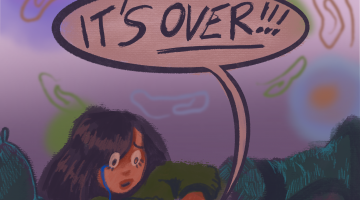It’s Wednesday March 30 and there is something different about the Quad at The University of Nevada. The per usual passerby crowd whose eyes would typically be glued to their illuminated handheld screens seems to be nowhere to be found. Instead, students are found barefoot listening to live music, participating in an array of offered arts and crafts, writing letters to loved ones, and actually engaging in conversation with their peers.
A scene that most would concur is almost unrecognizable these days, but made possible all thanks to the ASUN- hosted event Camp Grounded, an adult summer camp that encourages those who participate to leave their phones at the door in exchange for a silly name tag.
Instead of being so consumed by technology, students in attendance of the event took the afternoon to enjoy the warm weather, the company of those around them and most importantly the Quad served as a breeding ground for organic, genuine experiences.
In January 2014, Pew Research Center recorded 90 percent of American adults own a cellphone, 32 percent of American adults own an e-reader and 42 percent of American adults own a tablet computer. Later that October the center released that 64 percent of American adults owned a smartphone. Additionally, they also released that more than half of the population found themselves under the influence of their electronic device.
Do you find yourself falling into one of the statistics above? Well, it’s ok so do we. The amount of time we spend on electronic devices is outrageous and in turn deters us from things such as developing genuine relationships and experiencing life itself. These days we are all so consumed with our phones that conversations at dinner tables dissipate. We lose touch with what it’s like to cherish a moment because we are so obsessed with capturing the perfect Instagram picture. We let handheld devices devour us whole while life carries around us.
Digital devices aren’t all bad. They do some truly remarkable things. They have gifted us with a plethora of conveniences that we take advantage of in our everyday lives. Setting alarms, planning schedules, emailing at the drop of a pin, all things digital devices make available at our fingertips. Digital devices don’t hinder all relationships. They allow us to communicate and check-in with the people that mean the most to us in a convenient fashion at any time or place.
It is hard to get away from digital devices given the important role they play in today’s society, but we simply have to. We need to put down our digital devices, and let ourselves experience life in real time. The inability to connect to real people in front of you can lead to an uncomfortable isolation, for not only yourself but the people around you. The constant distraction devices cause keep us from seeing what’s right in front of us. The more we submerge ourselves in technology, while secluding ourselves from personal experiences the more desensitized we become.
For the most part everyone leaving the event seems to be in agreeance that the event was a breath of fresh air. Strangers enter a tea yurt setup in the quad to sit atop Thai inspired pillows, listen to a live acoustic set, sip fresh brewed herbal teas and engage in real conversation. Some entered the tea yurt initially as strangers, but upon departure, left as newfound friends. The onset stresses of class and other outside forces seemed like a distant worry when entering Camp Grounded.
There is a very important lesson to be learned from the Camp Grounded event. We should all spend a little more time in the present and a little less time with our smartphones glued to our palms. If only for a brief period of time, the students in the quad remembered a simpler more meaningful life can come as easily as setting aside digital distractions.
In the future, when we look back we won’t remember the times spent trolling Instagram or the hours we invested in sending text messages. We will remember moments like those that occurred last Monday in the quad.
The Nevada Sagebrush editorial staff can be reached at tbynum@sagebrush.unr.edu and on Twitter @TheSagebrush.










